Bill Barich: Long Way Home: On the Trail of Steinbeck’s America
October 23, 2010 by David
Filed under Non-Fiction, WritersCast
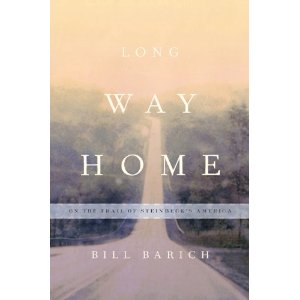 978-0802717542 – Walker & Co. – Hardcover – $26.00 (e-book version also available)
978-0802717542 – Walker & Co. – Hardcover – $26.00 (e-book version also available)
Bill Barich is a fine writer, comfortable with words, a natural storyteller who is self-aware and a careful observer of character as well as landscape. He’s got a great narrative voice that makes his books very easy to read and deeply engrossing.
In the summer of 2008, Barich, who has lived in Dublin, Ireland for some time, decided to take a journey across America, essentially following in the footsteps of the great John Steinbeck, who made the cross-country journey (ostensibly to rediscover America, but more likely a stab at rediscovering his own literary voice, which resulted in Travels with Charley in 1962).
Of course Barich and Steinbeck differ in significant ways. And the early 1960’s were a very different time than 2008 for America. Barich’s trip came at the time of our massive economic collapse, and the rising presidential campaign of Barack Obama, both of which become thematic backdrops for his story. Steinbeck traveled in pick up truck with a home made camper out back, and with his dog, Charley, whereas Barich drove a rented Ford Focus (almost 6000 miles!) and stayed in motels. But Steinbeck is the ever present model for the later traveler, whose outlook is certainly as different as the country he explores.
In fact, Barich’s story is engrossing from beginning to end. He starts the trip in Maryland, and stays on US 50 west to the Golden State, with stops and sidetrips along the way that are always interesting, even though often sad and sometimes even depressing. He is, after all, reporting on America as he finds it, which includes features and political themes that are not always what we might have wished or hoped for. It’s an honest portrait, and a story well told. I’ve done my share of cross-country traveling, and very much enjoyed this book and my conversation with Barich about it. There’s a good deal of back story and detail in this conversation we had some fun with and which I hope listeners will enjoy.
Bill Barich is the author of seven books, including Laughing in the Hills, which was named one of the hundred best sports books of all time. Other works include a novel, Carson Valley, and another work of nonfiction, A Fine Place to Daydream: Racehorses, Romance, and the Irish and recently, A Pint of Plain which describes the decline of the traditional Irish pub. A Guggenheim Fellow, and literary laureate of the San Francisco Public Library, Barich now lives and works in Dublin.
Podcast: Play in new window | Download
Publishing Talks: David Wilk interviews Vikram Narayan
October 18, 2010 by David
Filed under Ebooks and Digital Publishing, PublishingTalks, The Future
 In this series of interviews, called Publishing Talks, I have been talking to book industry professionals and other smart people about the future of publishing, books, and culture. This is a period of disruption and change for all media businesses. We must wonder now, how will publishing evolve as our culture is affected by technology, climate change, population density, and the ebb and flow of civilization and economics?
In this series of interviews, called Publishing Talks, I have been talking to book industry professionals and other smart people about the future of publishing, books, and culture. This is a period of disruption and change for all media businesses. We must wonder now, how will publishing evolve as our culture is affected by technology, climate change, population density, and the ebb and flow of civilization and economics?
I hope these Publishing Talks conversations will help us understand the outlines of what is happening, and how we might ourselves interact with and influence the future of publishing as it unfolds.
These interviews give people in and around the book business a chance to talk openly about ideas and concerns that are often only talked about “around the water cooler,” at industry conventions and events, and in emails between friends and they give people inside and outside the book industry a chance to hear first hand some of the most interesting and challenging thoughts, ideas and concepts being discussed by people in the book business.
It’s more or less common knowledge that today more books are written and published than at any time in human history, and the current rate of production certainly shows no sign of slowing anytime soon. This is true of all other art forms as well – we are surrounded by more music, video and every other form of art. Being found, heard, seen, and ultimately having one’s work experienced by an audience in an environment of vast abundance must therefore be the goal of all creators, writers, musicians, film-makers, etc. All content is competing for the valuable time that audiences have to give. This “attention economy” is at the heart of how the web affects the business of publishing.
For some writers, the social sphere, the engagement with readers, and the marketing work they undertake is a natural extension of their creative work. There are many other writers, of course, for whom marketing is a foreign concept, or who simply do not understand or feel comfortable with the emerging social network of the web. Whether they are sophisticated marketers or novices just starting to figure out how to find their communities, writers who are trying to take their work from the private to the public sphere are faced with a vast and sometimes opaque ecosystem of human culture.
Of course in this environment, tools have emerged to help them navigate this fluid and highly challenging environment, and learning how to use those tools becomes another challenge for writers.
A couple years ago I met Vikram Narayan, a young technologist from India, who was setting out to launch a business dedicated to creating marketing easier for writers and publishers. He started with one automated tool that would enable writers to make their books more visible on the web, and over the past couple of years, the business, now called BookBuzzr, has continued to evolve interesting, fun and easy-to-use tools that writers can use to better understand how they can connect with readers and to help them make that process more efficient and less daunting. Vikram recently sent me a PDF booklet called “The 10 Book Marketing Mistakes that Authors Make” and that spurred me to talk to him about his work.
Vikram is the founder of BookBuzzr Book Marketing Technologies Pvt. Ltd. based in Bangalore. His company provides a variety of book marketing and book promotion technologies to authors including the popular and free BookBuzzr Widget which has been referred to as a “portable author website” or “the calling card for the social Internet.” BookBuzzr also owns and operates Freado.com – the world’s biggest book-winning site with hundreds of books to be won (which is a cool way for authors to be discovered). Vikram has an MBA from Carnegie Mellon University. I recently talked to Vikram over Skype to hear some of his thoughts about marketing and books, what amounts to news from the front lines, where writers and readers are continually engaging, where the future of writing and reading can begin to be understood.
Podcast: Play in new window | Download
Nick Schou: Orange Sunshine: The Brotherhood of Eternal Love and Its Quest to Spread Peace, Love, and Acid to the World
October 13, 2010 by David
Filed under Non-Fiction
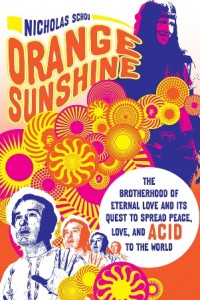 978-0312551834 – St. Martin’s Press – Hardcover – $24.99
978-0312551834 – St. Martin’s Press – Hardcover – $24.99
Nick Schou writes for the excellent OC Weekly (one of the several Village Voice papers) based in Orange County, California, home of Disneyland, Knott’s Berry Farm, UC Irvine, the Los Angeles Angels of Anaheim, Little Saigon, and of course seemingly endless tracts of California suburbia. But Orange County in the 1960’s was also the birthplace of some of the most amazing scenes of hippiedom, and the little known “Brotherhood of Eternal Love.”
In this book, Schou tells their story from beginning to end, and it is a pretty incredible saga, including what was probably the largest LSD manufacturing and distribution operation of all time, a world wide hashish and marijuana smuggling cartel, incredible tales involving Timothy Leary, and much, much more.
Known as “Hippie Mafia,” the Brotherhood began in the mid-1960’s as a small band of surfers (and in many cases petty criminals) in Southern California. After they discovered LSD, they took to Timothy Leary’s mantra of “Turn on, tune in, and drop out” and resolved to make that vision a reality by becoming the biggest group of acid dealers and hashish smugglers in the nation, and literally providing the fuel for the psychedelic revolution in the process. In Orange Sunshine, Schou journeys deep inside the Brotherhood, combining exclusive interviews with many of the group’s surviving members, former hangers on and supporters, and interstingly, the law enforcement establishment who pursued them and by doing so helped to launch what has now become an institutionalized government war on drugs.
Schou tells a compelling story of sex, drugs, and rock ‘n’ roll (and more drugs) that runs from Laguna Beach to Maui to Afghanistan, and a time when America moved from the golden era of peace and free love into the much darker time that soon followed, marked by hard drugs, international crime and paranoia.
Talking to Nick Schou gave me a chance to explore with him some of the background to the book, and to talk about the large amount of research he did to put it together, and the challenges he faced in getting some of the participants to even tell him what they did in those days. We also talked about some of the more startling elements of the story of the Brotherhood, their involvement with Timothy Leary and Ram Dass, Orange County then and now, and much more.
This is a fascinating story, one that helps us understand some of the complex issues that began in the sixties and are still with us today. This kind of grassroots history is important to document as it can give us all a chance to better comprehend the always diverse and sometimes simply amazing culture in which we live.
Podcast: Play in new window | Download
Publishing Talks: David Wilk interviews Andy Campbell
October 8, 2010 by David
Filed under Ebooks and Digital Publishing, PublishingTalks, Technology, The Future
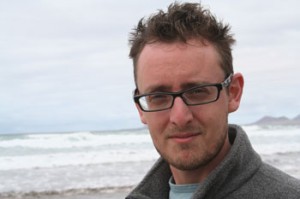 In this series of interviews, called Publishing Talks, I have been talking to book industry professionals and other smart people about the future of publishing, books, and culture. This is a period of disruption and change for all media businesses. We must wonder now, how will publishing evolve as our culture is affected by technology, climate change, population density, and the ebb and flow of civilization and economics?
In this series of interviews, called Publishing Talks, I have been talking to book industry professionals and other smart people about the future of publishing, books, and culture. This is a period of disruption and change for all media businesses. We must wonder now, how will publishing evolve as our culture is affected by technology, climate change, population density, and the ebb and flow of civilization and economics?
I hope these Publishing Talks conversations will help us understand the outlines of what is happening, and how we might ourselves interact with and influence the future of publishing as it unfolds.
These interviews give people in and around the book business a chance to talk openly about ideas and concerns that are often only talked about “around the water cooler,” at industry conventions and events, and in emails between friends and they give people inside and outside the book industry a chance to hear first hand some of the most interesting and challenging thoughts, ideas and concepts being discussed by people in the book business.
When I recently accidentally discovered the work of UK writer Andy Campbell, I was completely blown away. First because the work is so good, imaginative, creative that makes full use of the digital environment to tell stories in a thoroughly new way. But second, simply because I was so surprised that he had been doing this work for so long, and I had never learned of it before now. It’s just proof that the creative world we inhabit is so vast and full of creative individuals, fragmented and as full of stars as the night sky. And it is great fun to find new kinds of writers and writing, and learn so much from their own experiences.
Andy Campbell is a digital writer who has been working at the forefront of digital fiction since 1994. He is the author of Dreaming Methods, a website described by the UK’s Times Educational Supplement as “One of the most impressive purveyors of the new art of internet reading… a distinctive voice that couldn’t be replicated in print.” He is also co-director of One to One Productions Ltd, creating and facilitating multimedia projects for charities, arts organizations and others.
Andy is great fun to talk to, has some valuable insights and thoughts about the emergence and future of digital storytelling, and I hope this talk will gain him some new readers for his really exciting story telling. I think his work represents a profound shift in the way our culture imagines and tells its stories. (below a small screenshot from Nightingales Playground – “a young man attends a school reunion only to discover none of his old friends remember the same things he does”). Do visit Dreaming Methods, it is well worth the time to explore (and support this digital innovator by subscribing).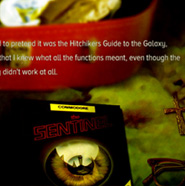
Podcast: Play in new window | Download
Jared Duval: Next Generation Democracy
October 2, 2010 by David
Filed under Non-Fiction, WritersCast
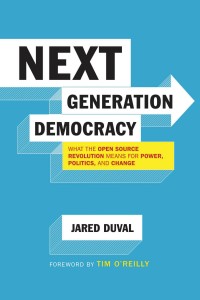 978-1608190669 – Bloomsbury – paperback – $15.00
978-1608190669 – Bloomsbury – paperback – $15.00
Next Generation Democracy is an important book by a really smart and compelling young activist and writer, Jared Duval. I like what Bill McKibben says about the book and by extension the author: “God knows previous generations have left those that are coming of age a world of trouble. Happily, they’re figuring out a world of ways to set them right. Jared Duval’s book offers a behind-the-scenes tour of the next wave of activism, organizing, inspiration, and change. It will give you cause to hope–and cause to go to work.”
But even more than a behind-the-scenes look at how activists are working and thinking together in new ways, Duval gives us a strong sense of hope for making change in the future. I think it’s true enough that the past few generations have not succeeded in broadening democracy and making progressive change throughout the world, especially in environmental, social justice and peace, as broad stroke categories of change that is needed most. But it’s heartening to know that the younger generation includes individuals like Duval who are finding new ways to make change, resist the impulse to blame and create divisions, and who see the tools of change around them everywhere, and simply make use of them so easily and comfortably.
Jared sees open source software as the exact model needed for a reinvention of democracy. Our government can be as open and transparent as the development of Linux, a story he tells here almost as a parable for political thinkers and activists. In Next Generation Democracy, Jared covers key recent events, such as Hurricane Katrina, during which de-centralized leadership emerged to supersede traditional models. He documents the success stories of these new leaders, both inside the government and out, who are finding effective, directly democratic ways to address the critical public challenges of our time. As he tells the stories of participatory organizations such as the brilliant SeeClickFix (originated in New Haven, Connecticut and now spreading to other communities) and America Speaks (which shows us how to meaningful re-engage citizens in the processes of government) Duval describes a new approach to solving complex problems that draws on the contributions of a wide array of activated citizens everywhere.
I do wish this book had come out earlier in the year, actually in time for election season, as I am certain that the thinking here could benefit anyone involved in the political process. But in the end, what really matters is that people read Next Generation Democracy, become inspired in some way, small or large, to get involved, work with their fellow citizens, make change, small or large, and address the future in a positive way. Reading this book and then listening to Jared Duval talk about his ideas and experiences certainly inspired me, and I am happy to recommend him and his book to anyone listening to this talk.
Jared Duval is a busy guy. He is a fellow at the well respected Demos policy organization and earlier served as the National Director of the Sierra Student Coalition (SSC), the national student chapter of the Sierra Club and the largest student environmental organization in America. During this time he helped build the Energy Action Coalition and the Campus Climate Challenge campaign, serving as the effort’s co-chair for two years.
Podcast: Play in new window | Download
Publishing Talks: David Wilk interviews Ron Martinez
September 27, 2010 by David
Filed under Ebooks and Digital Publishing, PublishingTalks, Technology, The Future
 In this series of interviews, called Publishing Talks, I have been talking to book industry professionals and other smart people about the future of publishing, books, and culture. This is a period of disruption and change for all media businesses. We must wonder now, how will publishing evolve as our culture is affected by technology, climate change, population density, and the ebb and flow of civilization and economics?
In this series of interviews, called Publishing Talks, I have been talking to book industry professionals and other smart people about the future of publishing, books, and culture. This is a period of disruption and change for all media businesses. We must wonder now, how will publishing evolve as our culture is affected by technology, climate change, population density, and the ebb and flow of civilization and economics?
I hope these Publishing Talks conversations will help us understand the outlines of what is happening, and how we might ourselves interact with and influence the future of publishing as it unfolds.
These interviews give people in and around the book business a chance to talk openly about ideas and concerns that are often only talked about “around the water cooler,” at industry conventions and events, and in emails between friends and they give people inside and outside the book industry a chance to hear first hand some of the most interesting and challenging thoughts, ideas and concepts being discussed by people in the book business.
Ron Martinez, is Managing Partner and Co-Founder of Invention Arts. His primary focus is on [aerbook], a web-based publishing and marketing platform that helps books and potential readers find one another on the social web (www.aerbook.com). Ron is a prolific inventor, with close to a hundred and fifty issued patents and patent applications currently in flight. He brings a combination of, technical, creative, intellectual property development and management, design, and strategic and operational business experience to his work at Invention Arts, and finds that his initial interest in computing as an expressive medium continues to define his agenda.
His introduction to the medium was in the mid-80’s, when he was an aspiring novelist in New York, writing YA adventure books, contributing to humor anthologies, writing comics for Heavy Metal and other publications–anything to put food on the table. A book packager asked him to adapt an Arthur C. Clarke novel, Rendezvous with Rama, to graphic adventure format, perhaps the first major author’s works to be so adapted. Taken with the expressive possibilities of the medium, Ron taught himself to program software and built an interactive fiction system, and went on to use that and enhancements to it, as well as entirely new systems, to write interactive fiction, original murder mysteries, political simulations, and other titles for publishers like Simon & Schuster, Spinnaker, Philips Interactive Media, Electronic Arts, and others. By the mid-90’s he was deeply interested in the design of story-rich, massively multiplayer online games. His game 10Six was one of the first of these, a social/tribal million player game published and operated by Sega. (Though built in the late 90’s, it continues to thrive as an indie game at ProjectVisitor.com. 10six introduced ownable, transactable virtual goods for the first time, a technology Ron was awarded a foundational patent for in 2001. Virtual goods models have since emerged as a dominant form of commerce for social networks and social games.
Prior to his current work at Invention Arts, Ron worked for a number of years as Vice President, Intellectual Property Innovation for Yahoo! There he designed and built the IP Innovation function which over a four year period delivered high volume targeted, patentable IP and productizable innovation. He also initiated Yahoo!’s content IP asset management and operations program, implementing a global, real-time rights infrastructure called Rights Engine.
His interests include invention techniques; the evolution of books and the current reimplementation of the publishing industry, intellectual property strategy; content rights; content IP and social distribution; electronic payments; virtual property; online payments; networked games; educational software; social media; social media advertising and marketing; social media monetization; mobile media; media metadata; media sharing and reuse; media remixing; and distributed media production.
It was from Ron’s announcement of Aerbook that I learned of his work. I was very excited as soon as I began exploring this project, because it launched just as I have been thinking about the implications of publishing as a social endeavor in the digital universe. Aerbook in fact is created around the notion of book as a multi-channel conversation between writers and readers, and I think it demonstrates concretely how powerfully publishing can be re-imagined. Ron’s experience as a writer who has mastered the skills and tools of software development and storytelling in a digital environment also brings forward the changes in how writers can work in this new environment. I hope you will find this discussion as interesting and thought provoking as it was for me talking to Ron Martinez. I think we are just now seeing the true beginnings of a “modern” form of publishing that will in fact expand the reach of writers and change their relationships with readers for the good of all.
Podcast: Play in new window | Download
Paul De Angelis: Dear Mrs. Kennedy, The World Shares Its Grief, Letters November 1963
September 23, 2010 by David
Filed under Non-Fiction, WritersCast
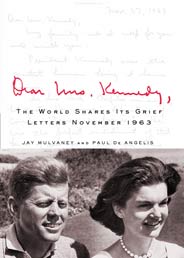 978-0312386153 – St. Martin’s Press – Hardcover – $19.99 (also available as an e-book at $9.99)
978-0312386153 – St. Martin’s Press – Hardcover – $19.99 (also available as an e-book at $9.99)
Are there more books about the Kennedys than about the Lincolns? I don’t know, but I am certain that there are many of them and my guess is that many who lived through the Kennedy era and many who did not, may feel they know everything they need to know about the Kennedys, JFK and Jackie, and the rest of the family. Reading this book may well change their minds.
In fact it’s a wonderful window into the heart and soul of America and in fact the world in the period just after the assassination of JFK in Dallas in November, 1963. Now almost a half century beyond that time, these letters, written by the famous and the ordinary, old and young, depict a period of extreme pain, emotional and social disruption, grief, sorrow, and disbelief that affected an incredible number of people all over the world. It gives us an opportunity to understand a great deal about how human beings respond to a devastating public tragedy. And some of the letters are simply beautiful, and transcendent in their expression of sympathy and emotion.
The story of the letters themselves is amazing – over 1 million condolence letters, notes and cards were sent to Jacqueline Kennedy in the months after the death of JFK. They were filed away and saved for many years, and despite a controversial culling in the 1980’s, there are still almost 400,000 letters, now cataloged and available for historians and journalists and the public to read and review. Editors Jay Mulvaney (who sadly passed away while working on this book) and subsequently Paul De Angelis, have given us a wonderful narrative and selection of letters that uses the words of the original writers to bring this terrible period in our history to life in an unusual and compelling tapestry of voices.
Paul De Angelis is a freelance editor and writer who lives in rural Connecticut. He’s been an editor, editorial director and editor-in-chief for a number of publishers. In our conversation about Dear Mrs. Kennedy, he talks about the process of putting this book together and highlights a number of the most interesting stories and letters in the book. For readers who lived through the 1960’s, this book will bring back many difficult emotions, and for readers for whom this is only history, these letters can bring the events of that period to life in a very powerful and compelling way, as the writers of these letters always speak from their hearts. You can see more from the book at Paul’s own website.
Full disclosure: the co-editor of this book, Paul De Angelis is a friend and occasional colleague, which does not make this book any less worth reading, of course.
Podcast: Play in new window | Download
Nicole Helget: The Turtle Catcher
September 15, 2010 by David
Filed under Fiction, WritersCast
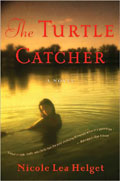 978-0547248004 – Mariner Books – paperback – $13.95 (also available as an e-book)
978-0547248004 – Mariner Books – paperback – $13.95 (also available as an e-book)
I found this book, written by an author I had never heard of before, by doing something very old fashioned: browsing in a bookstore. There are many forms of discovery, but finding a book you want to read in a store is still a great pleasure. And when you take it home and start reading it, and find out you made a lucky choice to read an exceptionally fine novel, that is a true and deeply rewarding experience.
I was surprised to learn that The Turtle Catcher is Nicole Helget’s first novel – she doesn’t write like a first novelist at all. The opening of this novel is absolutely perfect, and is beautifully written, setting the tone for a complicated, very often painful, but also engrossing story. Helget’s novel is mystical and magical, but these moments of “magical realism” where she enters another plane counterpoint brilliantly with the almost plainspoken story she has to tell about immigrant families in a German-American community in rural Minnesota in the early 20th century. The book is set in the now little discussed period just before, during and after World War I, a time that was very complicated for communities of recently arrived immigrants from the old country, with Germany now the enemy of their new homeland. The tensions within the town provide a taut backdrop for Helget’s for the focus of her story.
The author weaves together the lives of two families living on adjoining farms in the small town of New Germany, Minnesota. Liesel Richter and Lester Sutter are at the core of the book, along with their fathers and deeply suffering mothers, and what happens to Lester, told brilliantly and painfully in the opening scene of the book is the capstone to a long, rich story of families and communities, hidden wounds and deep suffering transformed into a kind of stoic transcendence Helget’s characters embrace, almost because it is all they are capable of doing in the face of such pain.
In The Turtle Catcher, Nicole Helget has created a multi-layered family story whose characters inhabit (and illustrate for readers) a specific place and time, but as with all great novels, through their story, they are transformed into something deeply moving and powerful. I really loved this novel, and will read it again, I am sure.
I wanted to talk to Nicole about the emotional content of the book, how she came to create this novel (it started with a short story), and discuss some of the complexities of her really wonderfully drawn characters. I think we succeeded in exploring this writer’s work in a really interesting conversation I hope will encourage readers to seek this novel out and read it for themselves. I do think Nicole Helget is a terrific writer, someone whose work I am deeply gratified to have discovered.
Podcast: Play in new window | Download
Publishing Talks: David Wilk interviews Peter Brantley
September 12, 2010 by David
Filed under Ebooks and Digital Publishing, PublishingTalks, The Future
 In this series of interviews, called Publishing Talks, I have been talking to book industry professionals and other smart people about the future of publishing, books, and culture. This is a period of disruption and change for all media businesses. We must wonder now, how will publishing evolve as our culture is affected by technology, climate change, population density, and the ebb and flow of civilization and economics?
In this series of interviews, called Publishing Talks, I have been talking to book industry professionals and other smart people about the future of publishing, books, and culture. This is a period of disruption and change for all media businesses. We must wonder now, how will publishing evolve as our culture is affected by technology, climate change, population density, and the ebb and flow of civilization and economics?
I hope these Publishing Talks conversations will help us understand the outlines of what is happening, and how we might ourselves interact with and influence the future of publishing as it unfolds.
These interviews give people in and around the book business a chance to talk openly about ideas and concerns that are often only talked about “around the water cooler,” at industry conventions and events, and in emails between friends and they give people inside and outside the book industry a chance to hear first hand some of the most interesting and challenging thoughts, ideas and concepts being discussed by people in the book business.
Peter Brantley is the Director of the Bookserver Project at the (totally cool) Internet Archive, a San Francisco-based not for profit library. He contributes regularly to several blogs on libraries and publishing, discussing transformations in media and information access. He serves on the board of the International Digital Publishing Forum, the standards setting body for digital books. Peter has significant experience with academic research libraries and digital library development programs, and was previously the Executive Director of the Digital Library Federation, a not for profit membership organization of research and national libraries.
As Peter pointed out to me recently, the word “rant” is a part of his name. So we could expect him to have something interesting to say about almost any subject related to books and the digital landscape. I think that comes across well in our talk. He brings to bear his experience as a librarian but also has a broad perspective on many subjects simply because he pays attention to so many ideas and developments across a wide spectrum of subject areas and interest groups. We had a lot of fun talking together, and hope listeners will enjoy our talk as well.
I am happy to say that this is the 100th post on Writerscast, a milestone of sorts, I suppose.
Podcast: Play in new window | Download
Avery Aames: The Long Quiche Goodbye
September 5, 2010 by David
Filed under Fiction, WritersCast
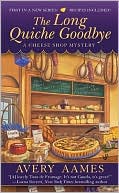 978-0425235522 – Berkley – Mass Market Paperback Original – $7.99 (also available as an ebook 978-1101188644 at $6.99)
978-0425235522 – Berkley – Mass Market Paperback Original – $7.99 (also available as an ebook 978-1101188644 at $6.99)
I don’t often read mysteries, but a few weeks ago, right in the middle of summer, the season for entertaining novels (often known as “beach reads”) I decided to give this novel a try. The tongue-in-cheek title first caught my attention, and I really liked the unusual setting for the novel (small town Ohio) and the quirky but very believable cast of characters. So The Long Quiche Goodbye is definitely a fun read but not just a throwaway summer book. Avery Aames is a good writer and she has deft with her creation and handling of characters.
As I mentioned, I am not a steady reader of mysteries, so I may not be as experienced as some are with the various forms and formats of mysteries – they do fall into a set of recognizable patterns, I know. In The Long Quiche Goodbye, our main character is Charlotte Bessette, the proprietor of the family owned cheese shop called Fromagerie Bessette, in the small town of Providence, Ohio. At the gala re-opening of the store after a full scale renovation and modernization, the store’s landlord (whom we already know not to like) is found stabbed to death with one of the store’s knives, and Charlotte’s grandmother is the prime suspect.
We’re off from there, with a full cast of local characters, friends, family, police, and a couple of other prime suspects in town to make things interesting. And it’s Charlotte who takes the lead in finding out who the real killer must be, as clearly, she feels (and we come to feel as well) that it could not have been her wonderful grandmother (who is the Mayor of the town!)
Avery Aames had a lot of fun writing The Long Quiche Goodbye, I think, and her pleasure and involvement with her characters comes across in the way she writes their story. I also had a great time talking to her about this well written book, her work as a writer, and the next books in the series that this book inaugurates. It looks like this series will be successful, and deservedly so – this first in the “Cheese Shop Mysteries” is already a national bestselling mystery novel. You can visit Avery’s website to learn more.
Podcast: Play in new window | Download
